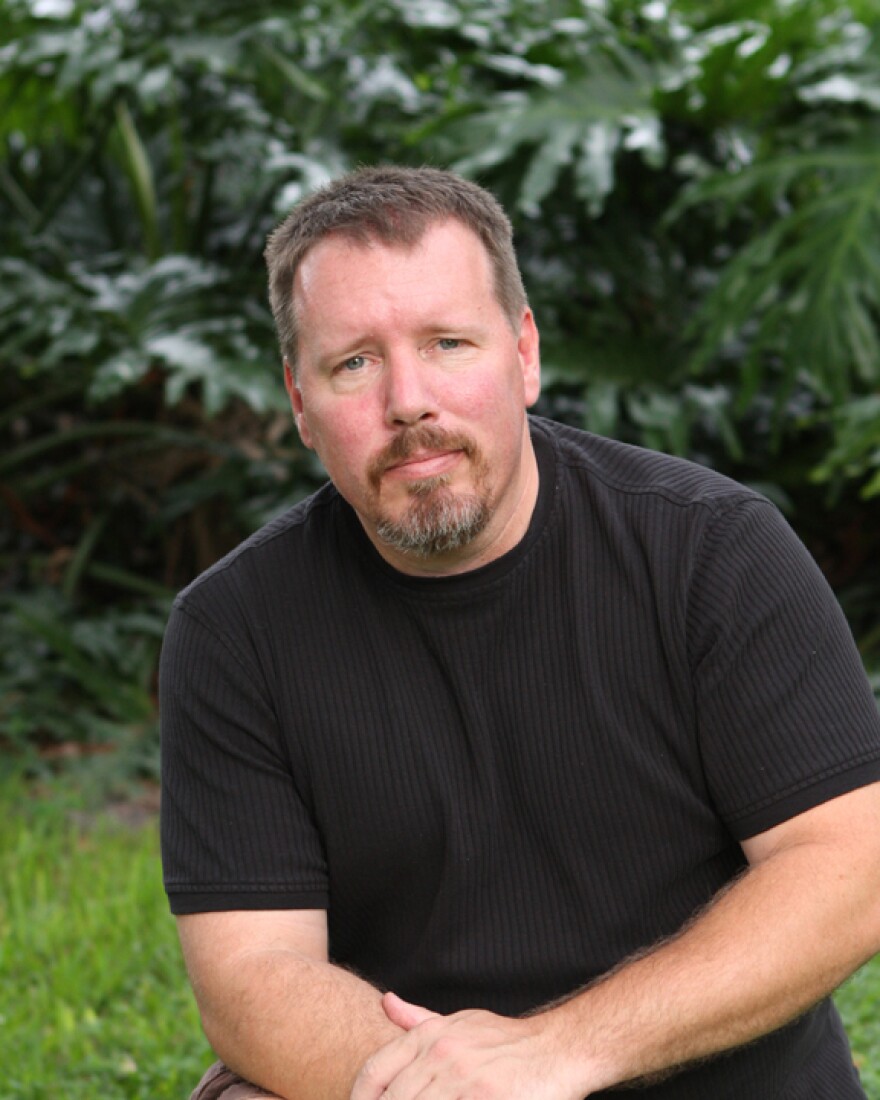Brian Turner was packed and ready to ship out for Iraq when his grandfather finally broke a decades’ long silence about his own combat experience. When the words came, they were to say that Turner should grab the biggest weapon and as much ammunition as he could carry.
The award-winning writer comes from a long line of veterans and ultimately joined their ranks because, he writes in his memoir, “I would’ve been ashamed in the years to come if I hadn’t…. because it would’ve meant that between me and the people I revered most there were beaches and jungle foliage and Russian MiGs and snipers and artillery craters…”

As one of millions of United States combat veterans, Turner shares an invisible wound called moral injury. And, as a member of that community who is a writer, he answers the call to support others who don’t have an outlet to sort through what they brought home with them.
For seven years, Turner was an infantryman who deployed to both Iraq and Bosnia-Herzegovina. He says making sense of what he experienced is difficult, but writing helps.
“We live in a world of memory, and we’re sort of three dimensional creatures of three different time zones: the past, the present moment, and thinking about the future,” he says. “But the past weighs so heavily — it’s the massive weight that pushes us into the present.”
Moral injury is not a mental illness, but it does profoundly affect a person’s mental health, says Rita Nakashima Brock, senior vice president of moral injury programs at Volunteers of America.
The term is relatively new, from the 1990s, and is a more accurate descriptor of what, in the past, might have been identified as Post Traumatic Stress Disorder or “shell shock.”
Moral injury is defined as the result of witnessing or doing something that goes against a core moral value.
“The suffering involved with moral injury is an indication that you have a healthy conscious, but it’s become ungrounded from meaning because of what you’ve done or had happen,” Brock says.

A new Veterans Administration report shows that between 2005 and 2015, an average of 6,132 veterans and 1,387 servicemembers died by suicide each year. Unattended moral injury is a contributor to these high numbers, according to Brock.
And she notes this kind of injury isn’t exclusive to veterans. It can also affect doctors, police officers, EMTs and first responders, professions where moral injury is sometimes called “burnout.”
“I think it’s pervasive in ways people don’t even realize,” Brock says. “Because it’s a moral dilemma that people face, sometimes they can compartmentalize it and keep functioning and even be professionally very successful, even as they’re very isolated and miserable.”
Brock and Turner agree that writing is a way to heal, even if a person has never tried it. When Turner works with writing groups for veterans, as he will at the Kansas City Library’s Plaza branch on September 15, he gives prompts to help them generate a piece that can be discussed and worked on during the event; he doesn’t expect anyone to come to the table with something already written.
And, he points out, people don’t have to write about war or combat specifically. He’s knows that he’s pegged as a war writer, but often that’s his setting more than it is his subject. Writing creates a space for him to examine topics such as love and loss within the context of his war experiences.

“In poetry,” he explains, “the word stanza means room. And so our stanzas, our paragraphs — language is the architectural space that we create to sometimes preserve an experience and the people inside those experiences. It’s not just a therapeutic sort of practice, but also a kind of sacred practice.”
Writing doesn’t just help with the retrieval of memory, Brock says. It also gives traumatized people a way to get a grip on the material before they try to share it.
“Writing gives them the chance to experience those feelings, which can seem overwhelming, but writing somehow keeps that under control. Sometimes when you open with speaking, people can get too deeply emotionally wrought, and then they feel overly exposed,” Brock says.
Turner says it’s crucial to pay attention to the veteran community to find a healthy way forward for the larger American community. He points out that it takes an entire nation to go to war, and though trauma is more prevalent in some bodies than others, trauma is ultimately distributed across the entire nation — so everyone needs to talk and think about it.
According to the New York Times, 14,000 U.S. troops are still in Afghanistan as the country approaches the 17th anniversary of the start of this war — the longest war in U.S. history. The Pentagon will no longer release a troop count for Iraq.
“A country that can wage wars for so long and basically pay no attention to them,” Turner says, “that isn’t just apathy to me, actually it’s a sign of a kind of illness and people aren’t aware that they’re in need of conversation.”
Invisible Wounds of War: Writing through Injury panel discussion, 10:15-11:30 a.m., and Brian Turner-led active duty and veterans writing workshop, 1-3 p.m. Saturday, September 15 at Kansas City Public Library’s Plaza branch, 4801 Main Street, Kansas City, Missouri 64112. Panel is free and open to the public and an RSVP is requested. Workshop is free and open to active duty military, veterans and family members. Registration is required.
Veterans Crisis Line for veterans, servicemembers, or their families: 1-800-273-8255 and press 1, or text 838255 for assistance.
Follow KCUR contributor Anne Kniggendorf on Twitter, @annekniggendorf.





